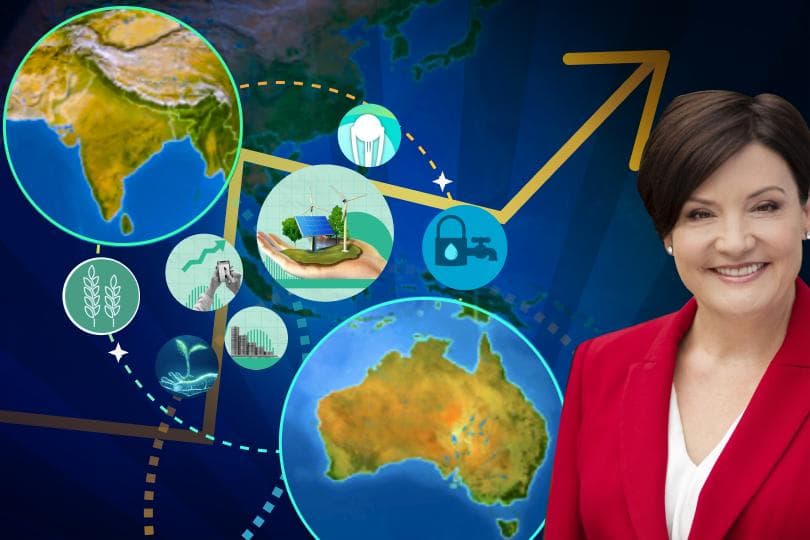New Heights in Aus-India Trade
Transformative journey of Aus-India trade, spotlighting growth in sustainability, education and tech

Jodi McKay is the Director of the Australia-India CEO Forum and the National Chair at the Australia-India Business Council. Speaking with IndusLens, she elaborates on the India-Australia trade relationship, highlighting its mutually beneficial nature propelling the partnership to new heights.
Q. How has the architecture supporting the Australia-India relationship evolved, and what roles do your organisations play in this development?
The relationship between Australia and India has a rich history. In 1947 Australia was the first nation to acknowledge India's independence, so we have a firm base for a friendship that is evolving into a robust partnership.
Organisations like the Australia India Business Council (AIBC) and the Australia India CEO Forum mirror this growth. The CEO Forum, founded in 2012, faced a setback in 2017 but was revitalised by the Indian and Australian Prime Ministers in 2023, reaffirming both countries' commitment to deepen business engagement. The AIBC, established 40 years ago, has also seen increased activity and impact, reflecting the strengthened relationship.
Q. Do you see India as a significant partner for Australia in sustainable agriculture and green energy?
Since the signing of the Economic Cooperation and Trade Agreement (ECTA) and the Comprehensive Strategic Partnership (CSP), trade opportunities have expanded significantly across various sectors. India, with its ambitious programs like the recent launch by PM Modi to install solar energy capacity for one crore houses, is poised to become a global leader in sustainable development. Given that rapid innovations and developments in sustainability are happening in Australia as well and renewable energy is key to ensuring affordability and accessibility to those in need, this sector presents a crucial opportunity for collaboration.
Though historically, agriculture has been a challenging sector for collaboration between the two countries, this has also seen significant progress under the ECTA. Both countries are now more willing to find common ground, recognising the potential of agri-tech and innovation. India excels in sustainable agriculture, while Australia specialises in food and water security. Comprehensive discussions between the countries in recognition of each other’s strengths and learnings will pave the way for mutual growth. The Australia-India CEO Forum's focus on agri-tech indicates that this sector will become a major area of collaboration.
Q. How is the Australia-India Economic Cooperation and Trade Agreement impacting bilateral trade?
In the last decade, Australia was the first Western nation that India decided to approach for a Free Trade Agreement, and it has proved to be crucial in strengthening India-Australia ties. Beyond tariff reductions, this agreement enhances economic opportunities by giving Australia larger access to Indian goods and markets. Australia stands to benefit long-term with such access to the Indian market, especially with the India-EU FTA in talks. This underscores the strategic significance of these agreements for Australia's economy.
In the last few years, bilateral trade between the two nations has been growing steadily, with significant growth in India's exports to Australia, particularly in engineered goods, garments, and electronics, largely due to the FTA.
Another key factor contributing to India's export growth is Australia's limited manufacturing capacity. While Australia aspires to be a manufacturing hub and has policies like ‘Made in Australia’, similar to "Make in India," it currently lacks the resources to manufacture goods on a large scale to meet its market demands. So, with India's expanding manufacturing sector, the countries are becoming more complementary in trade. There has been a 19% increase in the export of Indian cuisine to Australia driven by the ECTA and the demand from the Indian diaspora in Australia seeking their native cuisine. It's important to recognise that multiple factors are at play in the growth of trade between India and Australia, and all of them are contributing to the strengthening of their trade ties.
Q. What Indian market factors attract Australian investors? How could increased FDI impact India-Australia relations?
Foreign Direct Investment (FDI) is another aspect of India-Australia trade ties, but even after witnessing considerable growth, FDI has yet to reach the desired level. This can be attributed to outdated perceptions of India in Australia and an opaqueness about Indian markets among Australian investors. Similarly, Indians are not very aware of the investment opportunities in the Australian market.
The Australia-India CEO Forum also emphasises the need for increased investment flow between the two economies. While some Australian companies, such as Macquarie Group and several banks, are already investing in India, more companies need to recognise the opportunities available in one of the world's fastest-growing economies. Efforts, including those by the AIBC, aim to connect investors and businesses, providing them with the necessary support and assurance for their investments. Government initiatives in recent years have strengthened ties between India and Australia, but for these efforts to succeed, businesses and investors must match this enthusiasm. While government-led initiatives like the ECTA and CSP lay a solid foundation, growing awareness about business opportunities and fostering cultural understanding are also crucial for boosting investment exchanges. Continued dialogue is crucial for businesses to grasp the opportunities between India and Australia. Regular delegation visits are one of the mediums to sustain conversation. In addition, the impending CECA signing between the nations after a decade of discussions, will propel these bilateral relations and address market knowledge gaps.
Q. How are educational partnerships bringing nations closer?
The relationship between India and Australia in the education sector is also remarkable. Partnerships in this sector have grown significantly, with a five-fold increase in collaborations between 2007 and 2022, as per the Australia India Institute's mapping. Australia has been active in inviting international students to its shores, with Indian students contributing significantly to its educational diversity, many of whom eventually became part of the Indian diaspora here.
But in recent years, with its New Education Policy (NEP), India has been revolutionising its approach to education, focusing on increasing enrolment in its higher education institutes. This has prompted countries like Australia to look for more partnership projects in education with India, such as joint programmes between institutes and student exchanges. The new policy also encourages foreign universities to establish centres in India, such as Australia's Deakin University in GIFT City, Gujarat. The campus felt like a piece of Australia transplanted in India, offering students a similar experience to studying in Australia but at a significantly lower cost. Such initiatives are not only transforming the educational landscape but also enhancing cultural understanding and strengthening ties between India and Australia.
Q. How has the relationship between India and Australia evolved from the "3Cs" to the "3Ds" and now to the "3Es"?
The India-Australia relationship has evolved from the 3Cs (Commonwealth, Cricket, Curry) to the 3Ds (Democracy, Diaspora, Dosti) and now the 3Es (Energy, economy, Education), showcasing its depth and strategic nature. The transition to the 3Es was emphasised by the Indian PM at the Qudos Stadium last year during his Australian visit, marking the beginning of a new chapter. Government interventions have been pivotal in this shift, showing a commitment to exploring new cooperation avenues.
While Cricket forms a strong bond and a common language, the diaspora also plays a significant role in creating a connection. Australia, with its population of 25 million, boasts a million Indian Australians, who are a significant resource for both countries to tap as a gateway for investors and businesses across the two nations. The Indian PM Modi has been particularly brilliant in his efforts to harness the potential of the large Indian diaspora population across the world in advocating for India's interests globally, including enhancing commercial ties.
India's diverse landscape and cultural plethora offer Australian businesses ample opportunities across its 29 states. And the Indian diaspora can assist Australian investors navigate the nooks and crooks of the diverse subcontinent. The Centre for Australia-India Relations is also looking to tap into this diaspora as a bridge for deepening the friendship between the two nations.
Similar to India, Australia too has certain differences when it comes to different states – especially in terms of their priorities and industries, and each of them continues to engage with India according to those. Western Australia, for example, has been proactive in its exchanges with southern India, while New South Wales (NSW) and Victoria have established offices in Mumbai and Bengaluru, respectively. Queensland, traditionally known for its coal exports, is diversifying its offerings in India and is exploring collaborations for the 2036 Olympics which India is set to bid for. It's fascinating to note that a Queensland Brisbane company, Populous, designed the Narendra Modi Stadium. This highlights the deep ties between India and Australia, underscoring the need to further explore and nurture these connections.
Q. What are your impressions of Indian society and culture, having visited India and engaged with Indian nationals and the diaspora in Australia?
Having travelled frequently to India for work, I've witnessed the country's remarkable development while its cultural essence remains intact. Throughout my career, from serving as the former opposition leader and cabinet minister in the NSW parliament to representing the vibrant Indian Australian community, I've had the privilege of immersing myself in Indian culture.
Australia's growing Indian diaspora reflects the country's diverse communities from various Indian states and language groups. This immersion has deepened my appreciation for sarees, and traditional Indian clothing. In NSW, we have a dedicated Saree group, where I learned to drape a saree myself. I now have a collection of sarees from different regions of India, each telling a unique story.
Q. How can the two countries foster and maintain this partnership's growth?
Tourism is another significant aspect of the India-Australia relationship, highlighted by the AIBC including a chapter dedicated to sports, tourism, and culture. The growing number of flights between the two countries reflects the increasing interest in travel, especially among the Indian middle class. The large Indian diaspora in Australia also contributes to this trend, creating a readiness among Indians to explore Australia.
As we aim to sustain and deepen these ties, it's crucial to explore future opportunities beyond conventional trade and investment, with tourism presenting a significant avenue for strengthening the relationship. Also, the interest shown by Western and Southern Australia in sectors like space, defence, and tourism underscores Australia's eagerness to further connect with India.
In the remarkable journey of their 75-year relationship, India and Australia have achieved more in recent years than in the seven decades prior. However, sustaining this momentum requires continued effort from both nations. It is imperative for businesses to step up and play a pivotal role in maintaining enthusiasm in this bilateral relationship. As we look to the future, the partnership between India and Australia, crucial partners in the Indo-Pacific holds immense promise, with endless possibilities waiting to be explored and realised.

Jodi McKay 🇦🇺
Deep Dive
All about Trade: The bilateral trade between India and Australia in FY23 stood at US$ 25.9 billion, up from $18 billion in 2020.
Education Connection: As of 2021, Australian universities had 432 active formal partnership agreements with Indian higher education institutions.
Mates beyond FTA: India and Australia are preparing for Comprehensive Economic Cooperation Agreement


































